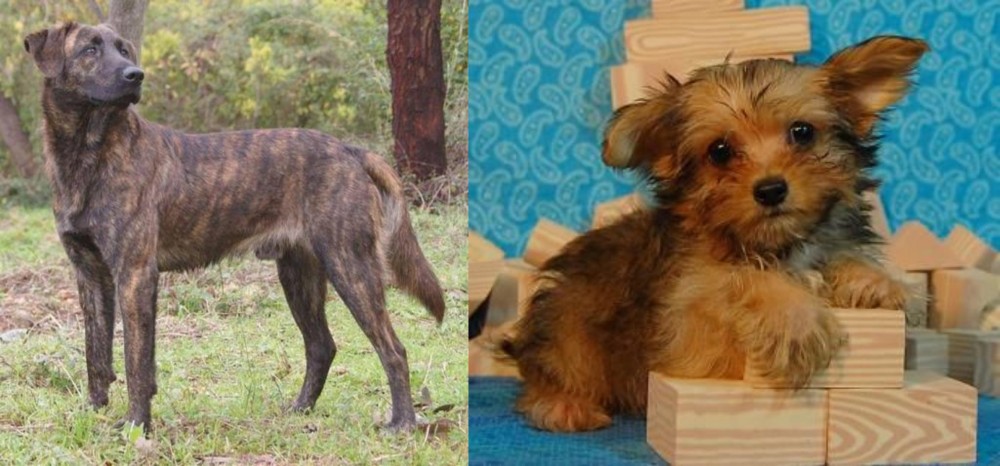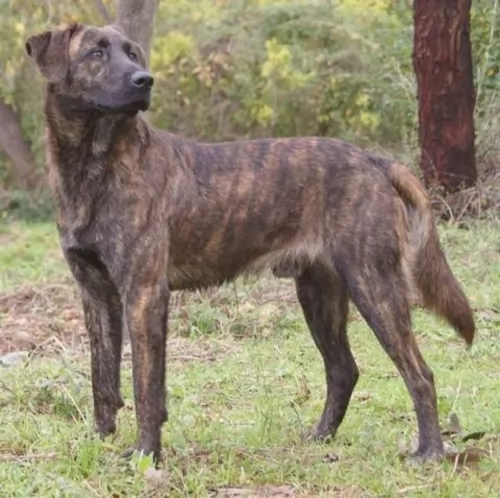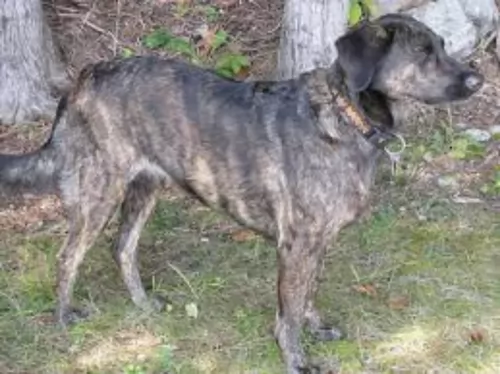 Both Treeing Tennessee Brindle and Yorkillon are originated from United States. Treeing Tennessee Brindle may grow 38 cm / 15 inches higher than Yorkillon. Treeing Tennessee Brindle may weigh 19 kg / 42 pounds more than Yorkillon. Both Treeing Tennessee Brindle and Yorkillon has almost same life span. Both Treeing Tennessee Brindle and Yorkillon has same litter size. Treeing Tennessee Brindle requires Low Maintenance. But Yorkillon requires Moderate Maintenance
Both Treeing Tennessee Brindle and Yorkillon are originated from United States. Treeing Tennessee Brindle may grow 38 cm / 15 inches higher than Yorkillon. Treeing Tennessee Brindle may weigh 19 kg / 42 pounds more than Yorkillon. Both Treeing Tennessee Brindle and Yorkillon has almost same life span. Both Treeing Tennessee Brindle and Yorkillon has same litter size. Treeing Tennessee Brindle requires Low Maintenance. But Yorkillon requires Moderate Maintenance
Basic Information
undefined
United States
United States
Life Span:
10 - 12 Years
12 - 14 Years
Other Names:
None
Papa-ShirePapa-Shire • Papiyork • Yorkie Pap Papillon-Yorkshire Terrier Mix, Papillon-Yorkie Mix,
Colors Available:
Brindle - tan and black, sometimes a bit of white
White, brown and white, light brown/golden, dark brown/chocolate, black and brown, black
Coat:
Short and quite soft
Straight, medium, fine fine, soft coat
Temperament:
Affectionate, Alert, Cheerful, Courageous, Curious, Docile, Energetic, Friendly, Gentle, Independent, Intelligent, Lively, Loving, Loyal, Outgoing, Playful, Quiet, Responsive, Social, Territorial
Alert, Energetic, Friendly, Loving, Loyal, Playful
Grooming:
Low Maintenance
Moderate Maintenance
New Owners Friendly:
Yes
Yes
History
 There doesn’t seem to be 100% clarity on how the dog came about but it originated in USA. It appears as though it was only since 1995 that records have been maintained through the American Kennel Club's Foundation Stock Service Program.
There doesn’t seem to be 100% clarity on how the dog came about but it originated in USA. It appears as though it was only since 1995 that records have been maintained through the American Kennel Club's Foundation Stock Service Program.
A Reverend Earl Phillips, who was a writer for a hunting magazine became aware of a Brindle Cur with a brown coat and tiger stripes. In fact ‘treeing’ is a type of hunting, where the dog chases an animal into a tree to escape. He heard about the dog’s amazing hunting skills.
In the early 1960s, he later formed The Treeing Tennessee Brindle Breeders Association, designed to protect the breed. It was in 2013 that the dog got foundation stock status with the American Kennel Club, but isn’t registered with the American Kennel Club.
The Yorkillon is a bighearted cross between the Yorkshire Terrier and the Papillon. They are small dogs with huge attitudes and big ears. They are known to be sassy and get into trouble. They are playful, affectionate and intelligent. They were initially developed in the US sometime about 20-30 years ago.
Not recognized by the American Kennel Club as they are considered designer dogs or mixed breeds
Description
 The Treeing Tennessee Brindle is a medium sized, deep chested breed of Cur, descending from the Old Brindle Cur dog.
The Treeing Tennessee Brindle is a medium sized, deep chested breed of Cur, descending from the Old Brindle Cur dog.
These strong dogs have a short, smooth brindle coat that is fairly soft to the touch. The coat's color is a mix of tan, black and a little bit of white.
He stands at between 41 and 61cm in height and weighs between 14 and 23kg both male and female. The Treeing Tennessee Brindle has a loud bark and it is best that this dog lives on a farm or in the suburbs as opposed to living in a small space in the city.
Temperament:
The Treeing Tennessee Brindle is a friendly, social dog and this is why he doesn’t make a particularly good watchdog.
He gets on well with children in the home as well as other dogs, not showing any aggression towards them.
They’re intelligent dogs and it will be a good idea to have them trained and socialized to make them well balanced and well behaved.
The Yorkillon is a small dog that can look like a Yorkie or a Papillon but most due have large ears like the Papillon. Both parent breeds have long hair and short legs. There is still a lot of first generation breeding, but most are now products of multigenerational breeding. This means that every puppy can look different and no two are likely to look the same.
Characteristics
 This brindle-colored cur dog is brave, intelligent and lively and his temperament allows him to be a good companion for his human family.
This brindle-colored cur dog is brave, intelligent and lively and his temperament allows him to be a good companion for his human family.
Even though they are friendly around strangers, they still make good watchdogs and will alert you to all kinds of visitors to your property. They do best in a home with large grounds and an active family where they can explore and sniff around. At the end of the day, they love to lie contentedly at your feet, a loyal, loving companion.
1.Children friendliness yes but be careful the children do not hurt the small dogs. This is particularly true regarding the risk of tracheal collapse.
2.Special talents – loves to do tricks
3.Adaptability – can live anywhere in an apartment as well as a home, but he would prefer to have a fenced yard to run in.
4.Learning ability – extremely smart and very obedient
Health Problems
 The Treeing Tennessee Brindle is a robust, healthy breed. You’re not likely to battle with too many health issues with him.
The Treeing Tennessee Brindle is a robust, healthy breed. You’re not likely to battle with too many health issues with him.
Watch out for ear infections which are more common in floppy eared dogs. Other common dog diseases that you need to know about -
Canine Distemper:
This is a viral disease which is highly contagious and with no known cure. It’s why there is a vaccine against it. Coughing, lethargy, high temperature and loss of appetite with vomiting are symptoms of this disease.
Canine Influenza:
This is another highly contagious respiratory viral infection transmitted between dogs in close proximity to each other, like in kennels for instance.
Symptoms include coughing, sneezing, nasal discharge, breathing difficulties, lethargy and loss of appetite. It’s important to get veterinary assistance as pneumonia could set in.
There are not a lot of hereditary health issues but there are some issues they can be prone to:
• Patellar Luxation – slipped knee caps can lead to lameness.
• Epilepsy – can be treated with medication.
• Diabetes – can be treated with medication
• Legg Calve Perthes Disease – blood disorder affecting hind leg bones.
• Heart defects
• Tracheal collapse
• Hip dysplasia – can cause lameness.
Caring The Pet
Grooming:
 A brush once or twice a week will be sufficient for this dog. Look inside his ears for signs of redness which could indicate an ear infection. Make sure his eyes are still bright and not red and with a pus discharge. Trim his nails too.
A brush once or twice a week will be sufficient for this dog. Look inside his ears for signs of redness which could indicate an ear infection. Make sure his eyes are still bright and not red and with a pus discharge. Trim his nails too.
Exercise:
The Treeing Tennessee Brindle is a high energy dog and he is going o want more than just a walk every day, although he will love that and rely on you for this daily outing.
He will also want ball games and hide and seek games.The breed needs an active owner who will take him on long walks and hikes.
Diet:
Whenever you opt to give a dog commercially manufactured dog food, you need to check that the dog food is made with high-quality ingredients which are mostly made up of protein or meat.
Certainly a puppy will need protein in his food for proper growth and he will require 4 bowls of food a day. An adult dog will require 2 bowls of food a day.
The type of commercial dog food you buy will depend on the age of your dog as well as his activity levels. If your dog has a known allergy or illness, there are dog foods manufactured with that in mind.
Try and in include some homemade food into his diet. Nothing spicey and exotic as this can cause stomach problems. A good guide is boiled chicken, brown rice and vegetables.
1.Feeding the puppy Feed a high quality toy puppy food 3-4 meals per day a total of ¼ cup for the day.
2.Feeding the adult Feed a high quality toy puppy food 1-2 meals per day a total of ½ cup for the day.
3.Points for Good Health – No inherited issues.
4. Games and Exercises – These are high energy dogs as both parent breeds are such. They need to run, love having a fenced yard, 15-20 minute walks per day.
Comparison with other breeds
- Yorkillon vs English Bulldog - Breed Comparison
- Yorkillon vs German Shepherd - Breed Comparison
- Yorkillon vs Golden Retriever - Breed Comparison
- Yorkillon vs Labrador Retriever - Breed Comparison
- Yorkillon vs West Highland White Terrier - Breed Comparison
- Yorkillon vs French Bulldog - Breed Comparison
- Yorkillon vs Beagle - Breed Comparison
- Yorkillon vs Yorkshire Terrier - Breed Comparison
- Yorkillon vs Poodle - Breed Comparison
- Yorkillon vs Rottweiler - Breed Comparison
- Yorkillon vs Boxer - Breed Comparison
- Yorkillon vs English Pointer - Breed Comparison
- Yorkillon vs Siberian Husky - Breed Comparison
- Yorkillon vs Doberman Pinscher - Breed Comparison
- Yorkillon vs American Bully - Breed Comparison
- Yorkillon vs Abruzzenhund - Breed Comparison
- Yorkillon vs Affenpinscher - Breed Comparison
- Yorkillon vs Afghan Hound - Breed Comparison
- Yorkillon vs Aidi - Breed Comparison
- Yorkillon vs Airedale Terrier - Breed Comparison
- Yorkillon vs Akbash Dog - Breed Comparison
- Yorkillon vs Akita - Breed Comparison
- Yorkillon vs Africanis - Breed Comparison
- Yorkillon vs Askal - Breed Comparison
- Yorkillon vs Atlas Terrier - Breed Comparison
- Treeing Tennessee Brindle vs English Bulldog - Breed Comparison
- Treeing Tennessee Brindle vs German Shepherd - Breed Comparison
- Treeing Tennessee Brindle vs Golden Retriever - Breed Comparison
- Treeing Tennessee Brindle vs Labrador Retriever - Breed Comparison
- Treeing Tennessee Brindle vs West Highland White Terrier - Breed Comparison
- Treeing Tennessee Brindle vs French Bulldog - Breed Comparison
- Treeing Tennessee Brindle vs Beagle - Breed Comparison
- Treeing Tennessee Brindle vs Yorkshire Terrier - Breed Comparison
- Treeing Tennessee Brindle vs Poodle - Breed Comparison
- Treeing Tennessee Brindle vs Rottweiler - Breed Comparison
- Treeing Tennessee Brindle vs Boxer - Breed Comparison
- Treeing Tennessee Brindle vs English Pointer - Breed Comparison
- Treeing Tennessee Brindle vs Siberian Husky - Breed Comparison
- Treeing Tennessee Brindle vs Doberman Pinscher - Breed Comparison
- Treeing Tennessee Brindle vs American Bully - Breed Comparison
- Treeing Tennessee Brindle vs Abruzzenhund - Breed Comparison
- Treeing Tennessee Brindle vs Affenpinscher - Breed Comparison
- Treeing Tennessee Brindle vs Afghan Hound - Breed Comparison
- Treeing Tennessee Brindle vs Aidi - Breed Comparison
- Treeing Tennessee Brindle vs Airedale Terrier - Breed Comparison
- Treeing Tennessee Brindle vs Akbash Dog - Breed Comparison
- Treeing Tennessee Brindle vs Akita - Breed Comparison
- Treeing Tennessee Brindle vs Africanis - Breed Comparison
- Treeing Tennessee Brindle vs Askal - Breed Comparison
- Treeing Tennessee Brindle vs Atlas Terrier - Breed Comparison
 Petzlover
Petzlover Both Treeing Tennessee Brindle and Yorkillon are originated from United States. Treeing Tennessee Brindle may grow 38 cm / 15 inches higher than Yorkillon. Treeing Tennessee Brindle may weigh 19 kg / 42 pounds more than Yorkillon. Both Treeing Tennessee Brindle and Yorkillon has almost same life span. Both Treeing Tennessee Brindle and Yorkillon has same litter size. Treeing Tennessee Brindle requires Low Maintenance. But Yorkillon requires Moderate Maintenance
Both Treeing Tennessee Brindle and Yorkillon are originated from United States. Treeing Tennessee Brindle may grow 38 cm / 15 inches higher than Yorkillon. Treeing Tennessee Brindle may weigh 19 kg / 42 pounds more than Yorkillon. Both Treeing Tennessee Brindle and Yorkillon has almost same life span. Both Treeing Tennessee Brindle and Yorkillon has same litter size. Treeing Tennessee Brindle requires Low Maintenance. But Yorkillon requires Moderate Maintenance There doesn’t seem to be 100% clarity on how the dog came about but it originated in USA. It appears as though it was only since 1995 that records have been maintained through the American Kennel Club's Foundation Stock Service Program.
There doesn’t seem to be 100% clarity on how the dog came about but it originated in USA. It appears as though it was only since 1995 that records have been maintained through the American Kennel Club's Foundation Stock Service Program. The Treeing Tennessee Brindle is a medium sized, deep chested breed of Cur, descending from the Old Brindle Cur dog.
The Treeing Tennessee Brindle is a medium sized, deep chested breed of Cur, descending from the Old Brindle Cur dog. This brindle-colored cur dog is brave, intelligent and lively and his temperament allows him to be a good companion for his human family.
This brindle-colored cur dog is brave, intelligent and lively and his temperament allows him to be a good companion for his human family. The Treeing Tennessee Brindle is a robust, healthy breed. You’re not likely to battle with too many health issues with him.
The Treeing Tennessee Brindle is a robust, healthy breed. You’re not likely to battle with too many health issues with him. A brush once or twice a week will be sufficient for this dog. Look inside his ears for signs of redness which could indicate an ear infection. Make sure his eyes are still bright and not red and with a pus discharge. Trim his nails too.
A brush once or twice a week will be sufficient for this dog. Look inside his ears for signs of redness which could indicate an ear infection. Make sure his eyes are still bright and not red and with a pus discharge. Trim his nails too.